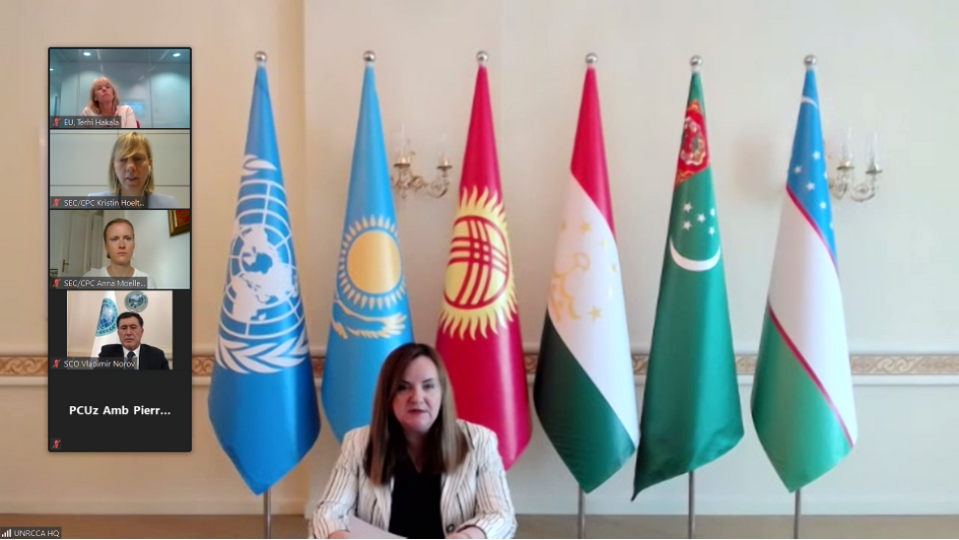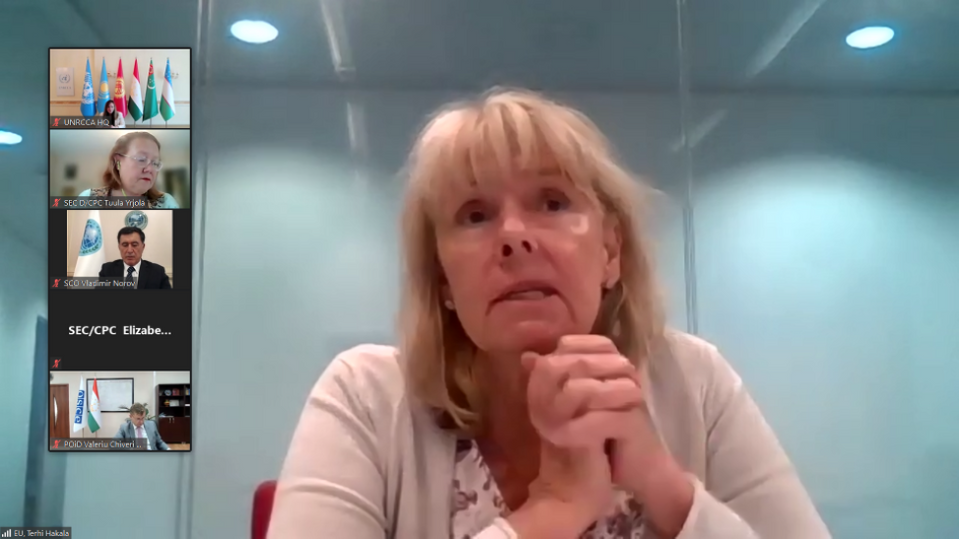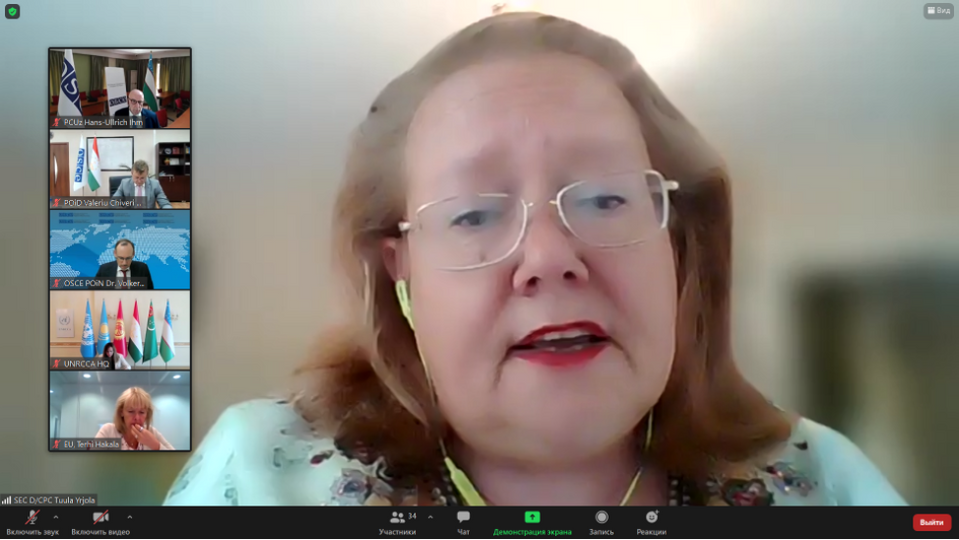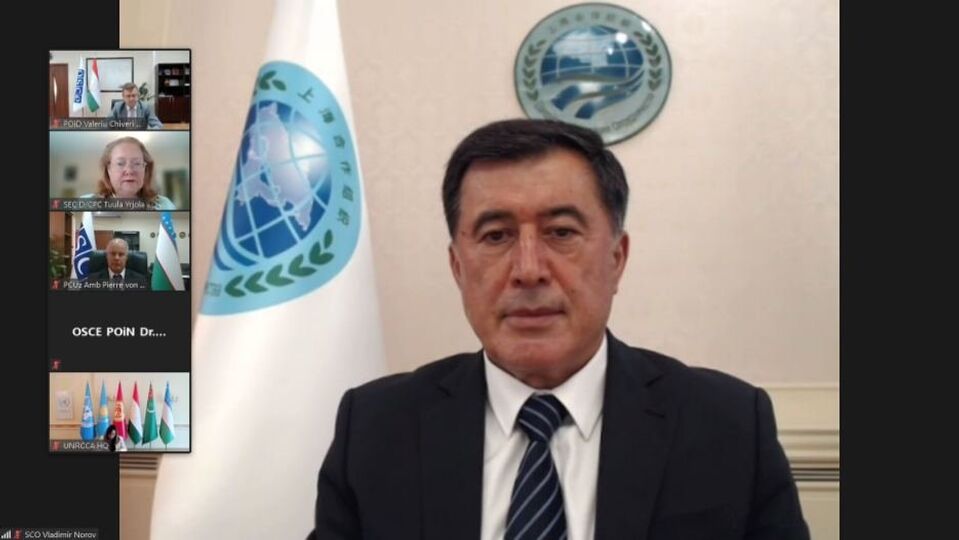On 9 July 2021, SCO Secretary-General Vladimir Norov took part in the regional meeting of the heads of OSCE Central Asian offices titled Security Challenges in Afghanistan and Implications for the Participation of International Partners in Central Asia.
The UN Secretary-General's Special Representative for Central Asia (CA) Natalia Gherman, EU Special Representative for Central Asia Terhi Hakala, Director of the OSCE Conflict Prevention Centre Tuula Yrjola and heads of OSCE missions in CA countries also attended the event.

The participants shared their views on prospects for the upcoming withdrawal of foreign troops from Afghanistan and discussed ways to mitigate the ramifications associated with changes in the security situation in Afghanistan and Central Asia in the future.
Addressing the participants, Vladimir Norov noted that peace and stability in Afghanistan are among the main factors in ensuring security in the SCO space, primarily, the Central Asian countries.

He underscored that as traditional partners of Afghanistan, the SCO member states operate on the premise that there is no alternative to overcoming the intra-Afghan conflict via political dialogue and carrying out an inclusive peace process by the Afghans themselves and led by the Afghans themselves, as well as on the basis of respect for that country's sovereignty and territorial integrity.
The SCO Secretary-General said that the SCO countries' concrete and practical steps with regard to Afghanistan will be discussed at a meeting of the SCO-Afghanistan Contact Group to be held at the level of foreign ministers in Dushanbe on 14 June. The forthcoming summit will be used to approve a new Work Plan for implementing the existing SCO Anti-Drug Strategy.

"The SCO's remains primarily focused on matters related to suppression and containment of threats coming from terrorist and extremist groups in the border regions of Afghanistan.
In this regard, we look forward to promoting close interaction with our Afghan friends through the SCO Regional Anti-Terrorist Structure," the SCO Secretary-General said.
Mr Norov closed his remarks by highlighting the importance of strengthening contacts with relevant UN agencies in order to implement the UN Global Counter-Terrorism Strategy in Central Asia, to exchange experience in fighting drug trafficking, and implement joint infrastructure projects designed to promote regional connectivity.
The UN Secretary-General's Special Representative for Central Asia (CA) Natalia Gherman expressed concern over the current situation in Afghanistan, noting that the military-political situation in the country directly affected regional security in Central Asia.
In this context, Ms Gherman, in a positive manner, reminded the participants about the Interconnectivity of Central and South Asia international conference, which will be held on 15-16 July 2021. According to the diplomat, this conference clearly demonstrates the existence of strategic vision and a systematic approach by the leadership of Uzbekistan in matters of ensuring regional security in Central Asia.
EU Special Representative for Central Asia Terhi Hakala noted the importance of such meetings for the analysis and subsequent formation of reconciled views on ensuring peace and security in Afghanistan. In this context, Ms Hakala highlighted the SCO's important role in consolidating the efforts of the Central Asian countries, Afghanistan's neighbours and other major actors in promoting the Afghan peace process.
She noted that the withdrawal of foreign troops could provoke a surge in the refugee flow and an outbreak of radicalism and extremism, as well as set the stage for the scaling up of drug production and the expansion of the influence of terrorist organisations in Afghanistan. In this regard, the diplomat said that the EU will continue to expand its diplomatic and humanitarian presence in Afghanistan.
Director of the OSCE Conflict Prevention Centre Tuula Yrjola noted that since Afghanistan borders on Central Asian countries such as Tajikistan, Uzbekistan and Turkmenistan, the current uncertainty created by the withdrawal of the foreign military contingent is dictating, as never before, the need to consolidate the efforts of international organisations and the Central Asian countries in order to facilitate the Afghan peace process.
The heads of the OSCE missions to Central Asia also spoke at the meeting. They were unanimous in their opinion about the need to further consolidate the efforts of the UN, the OSCE, the EU and the SCO, as well as the Central Asian countries in advancing the peace process and promoting peace and stability in Afghanistan.
The meeting was attended by more than 35 diplomats and experts in matters of peaceful settlement in Afghanistan.
